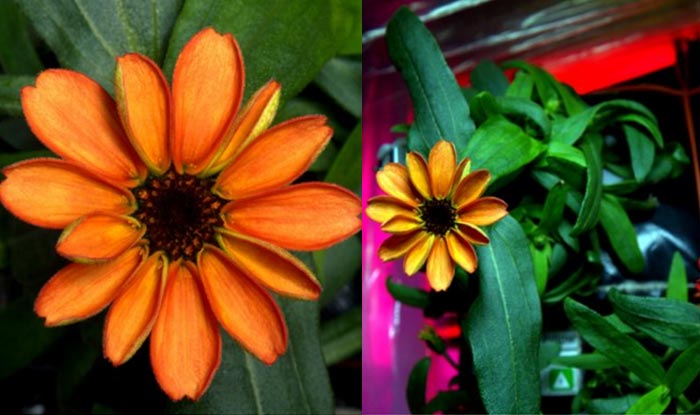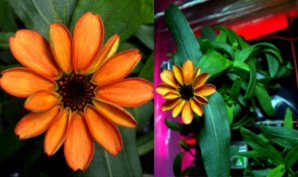It wouldn’t be wrong if Scott Kelly, an astronaut from NASA, were to brag about his green thumb all day long, for after all he has earned that right by successfully growing the world’s first flower in space.
The zinnia plants the ISS crew had planted almost gave up and died within a timeframe of just 2 weeks. When trying to figure out why exactly that happened, the team noticed symptoms of excessive humidity and limited air flow. The plant’s wicks leaked water and the offshoots became horribly curled and bent.
Around Christmas, some of the plants even grew mold.
That is when Kelly decided to take up this challenge. He informed NASA that instead of following a timed schedule, he would water the plants as per what he thinks is their requirement.
"...if we're going to Mars, and we were growing stuff, we would be responsible for deciding when the stuff needed water," said Kelly.
Although a couple of plants died anyway, however, more importantly, Kelly succeeded in nurturing a plant that not only grew successfully but flowered as well.
The deal plants and their molds haven’t gone to waste, they will be brought back and studied so that we can get a handle of how to grow plants in outer space, or on Mars, in particular.
NASA selected zinnias, at this stage, since they have a longer growth cycle than romaine lettuces, which make them a significant stepping stone for growing tomatoes.
Sometime earlier, the ISS crew had managed to grow vegetables, however that effort suffered a setback with the first batch dying of drought. However, eventually the team had managed to grow and eat their own produce.
Although it will take some more time before NASA allows its astronauts to grow tomatoes in space, the plan itself sounds rather promising. Especially after having watch Matt Damon consume nothing but bland potatoes in The Martian.
Thanks to experiments such as this, someday future space travelers will be able to grow crops on some distant planet.
The zinnia plants the ISS crew had planted almost gave up and died within a timeframe of just 2 weeks. When trying to figure out why exactly that happened, the team noticed symptoms of excessive humidity and limited air flow. The plant’s wicks leaked water and the offshoots became horribly curled and bent.
Around Christmas, some of the plants even grew mold.
That is when Kelly decided to take up this challenge. He informed NASA that instead of following a timed schedule, he would water the plants as per what he thinks is their requirement.
"...if we're going to Mars, and we were growing stuff, we would be responsible for deciding when the stuff needed water," said Kelly.
Although a couple of plants died anyway, however, more importantly, Kelly succeeded in nurturing a plant that not only grew successfully but flowered as well.
The deal plants and their molds haven’t gone to waste, they will be brought back and studied so that we can get a handle of how to grow plants in outer space, or on Mars, in particular.
NASA selected zinnias, at this stage, since they have a longer growth cycle than romaine lettuces, which make them a significant stepping stone for growing tomatoes.
Sometime earlier, the ISS crew had managed to grow vegetables, however that effort suffered a setback with the first batch dying of drought. However, eventually the team had managed to grow and eat their own produce.
Although it will take some more time before NASA allows its astronauts to grow tomatoes in space, the plan itself sounds rather promising. Especially after having watch Matt Damon consume nothing but bland potatoes in The Martian.
Thanks to experiments such as this, someday future space travelers will be able to grow crops on some distant planet.






